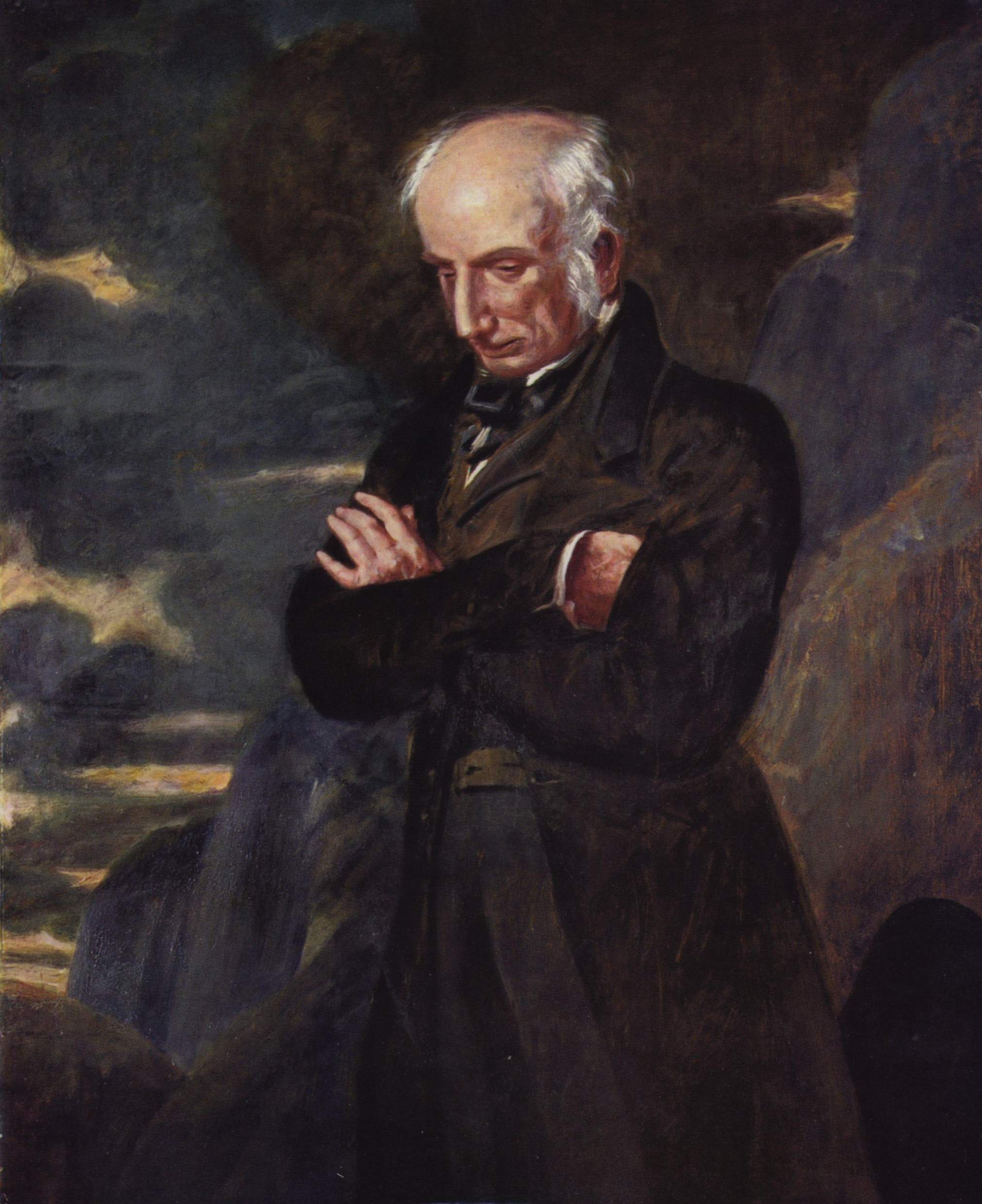“Los placeres recién descubiertos son dulces. Cuando mienten sobre nuestros pies.”
Fuente: To the Same Flower, capítulo 1 (1803).
William Wordsworth fue uno de los más importantes poetas románticos ingleses. Con Samuel Taylor Coleridge, contribuyó a la evolución de la época romántica en la literatura inglesa con su publicación conjunta de Baladas líricas en 1798. Esta obra influyó de modo determinante en el paisaje literario del siglo XIX. Fue el poeta laureado de Inglaterra desde 1843 hasta su muerte en 1850.
El carácter fuertemente innovador de su poesía, ambientada en el sugerente paisaje del Lake District , en el norte de Cumberland, radica en la elección de los protagonistas, personajes de humilde extracción, del tema, que es la vida cotidiana, y del lenguaje, sencillo e inmediato.
Wordsworth, Coleridge y Southey fueron conocidos como lakistas, por inspirarse en el mismo paisaje de los lagos.
Wikipedia

“Los placeres recién descubiertos son dulces. Cuando mienten sobre nuestros pies.”
Fuente: To the Same Flower, capítulo 1 (1803).
“Dulces dias infantiles, que eran siempre. Veinte días son ahora.”
Como una mariposa (I've Watched You Now a Full Half-Hour), sección. 2 (1801).
Fuente: http://www.gutenberg.org/browse/authors/w#a2879
“El arte es expresión de los sentimientos y emociones del artista.”
A Narrow Girdle of Rough Stones and Crags, l. 37 (1803).
Fuente: http://rpo.library.utoronto.ca/redirect/fromlink.cfm?new=poet/363.html
“That heareth not the loud winds when they call,
And moveth all together, if it moves at all.”
Stanza 11.
Resolution and Independence (1807)
“But he is risen, a later star of dawn.”
A Morning Exercise.
Bartlett's Familiar Quotations, 10th ed. (1919)
Song at the Feast of Brougham Castle, l. 161 (1807).
“Turning, for them who pass, the common dust
Of servile opportunity to gold.”
Desultory Stanza.
Bartlett's Familiar Quotations, 10th ed. (1919)
“A poet could not but be gay,
In such a jocund company.”
Stanza 3.
I Wandered Lonely as a Cloud http://www.bartleby.com/145/ww260.html (1804)
“Every gift of noble origin
Is breathed upon by Hope’s perpetual breath.”
These Times strike Monied Worldlings.
Bartlett's Familiar Quotations, 10th ed. (1919)
Variante: Every gift of noble origin
Is breathed upon by Hope’s perpetual breath.
“Who is the happy Warrior? Who is he
That every man in arms should wish to be?”
Fuente: Character of the Happy Warrior http://www.bartleby.com/145/ww302.html (1806), Line 1.
“How fast has brother followed brother,
From sunshine to the sunless land!”
Extempore Effusion upon the Death of James Hogg.
Bartlett's Familiar Quotations, 10th ed. (1919)
Written in March, st. 2 (1801).
Weak is the Will of Man.
Bartlett's Familiar Quotations, 10th ed. (1919)
Strange Fits of Passion Have I Known, st. 7 (1799).
Lyrical Ballads (1798–1800)
The Tables Turned.
Bartlett's Familiar Quotations, 10th ed. (1919)
Ode to Lycoris.
Bartlett's Familiar Quotations, 10th ed. (1919)
“Two Voices are there; one is of the sea,
One of the mountains; each a mighty Voice.”
Thought of a Briton on the Subjugation of Switzerland, l. 1 (1807).
She Dwelt Among the Untrodden Ways, st. 1 (1799).
Lyrical Ballads (1798–1800)
“And you must love him, ere to you
He will seem worthy of your love.”
Stanza 11.
A Poet's Epitaph (1799)
“And often, glad no more,
We wear a face of joy because
We have been glad of yore.”
The Fountain, st. ?? (1799).
Bartlett's Familiar Quotations, 10th ed. (1919)
She Dwelt Among the Untrodden Ways, st. 3 (1799).
Lyrical Ballads (1798–1800)
The Triad.
Bartlett's Familiar Quotations, 10th ed. (1919)
To the Lady Fleming, st. 7 (1823).
“The light that never was, on sea or land,
The consecration, and the poet's dream.”
Elegiac Stanzas. Suggested by a Picture of Peele Castle in a Storm, st. 4 (1805).